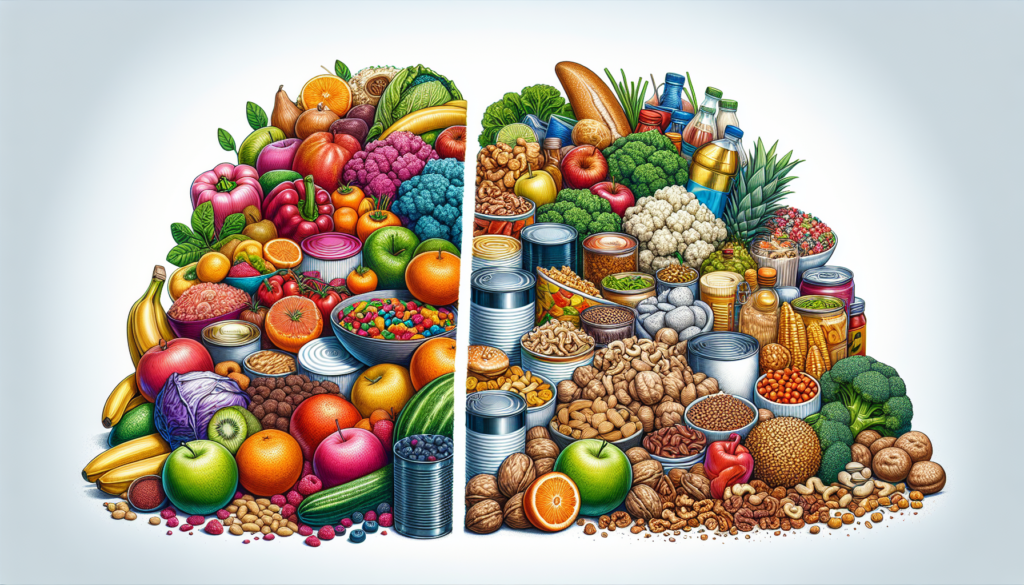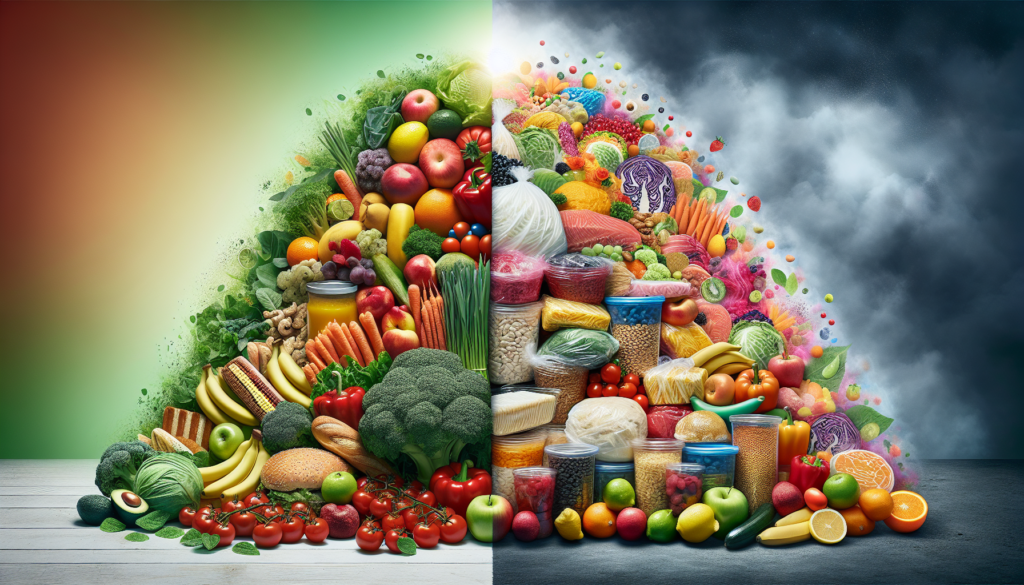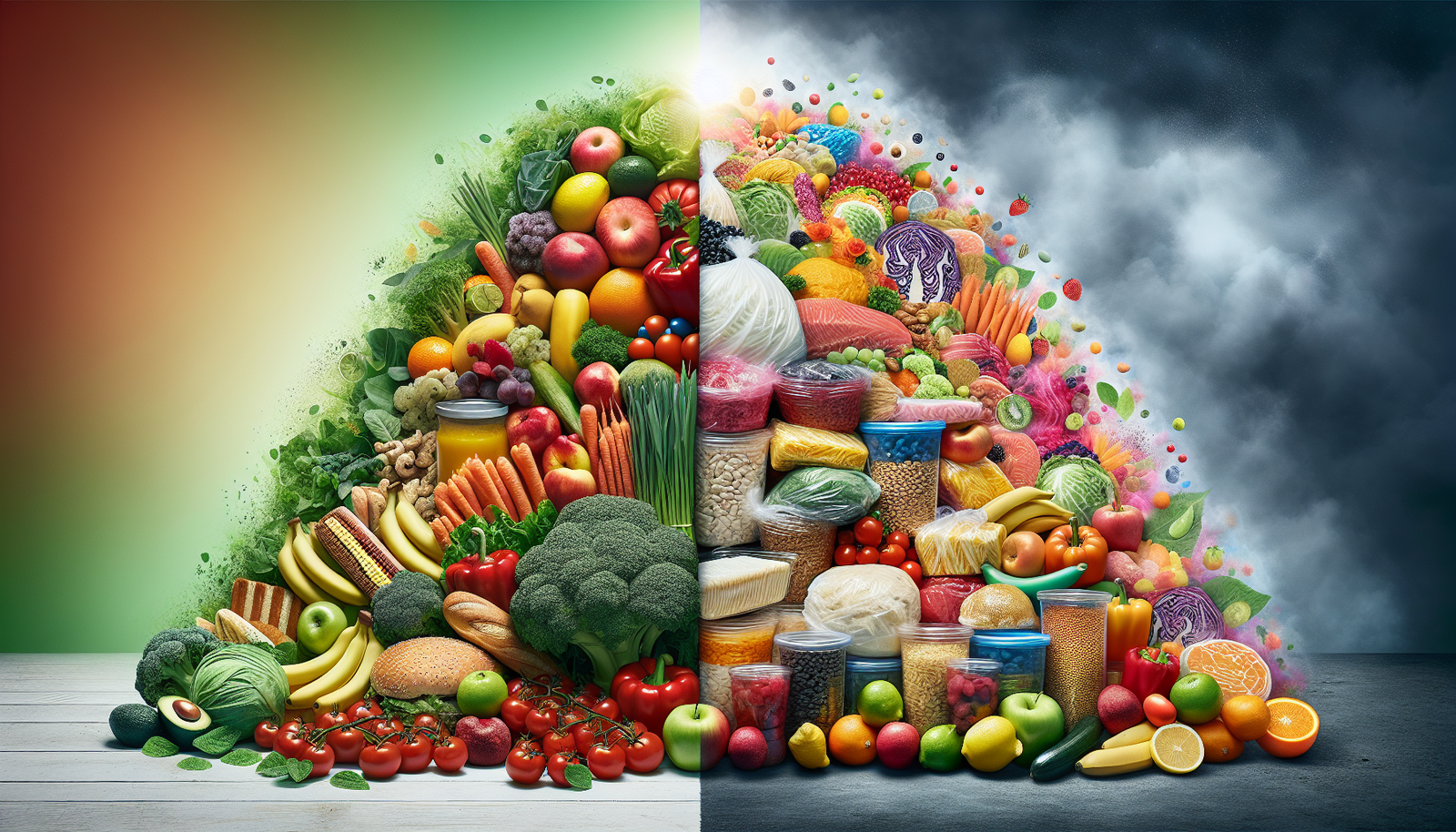Imagine a life where you feel energized, nourished, and revitalized every day. A life where you break free from the shackles of processed foods and embrace a natural, wholesome way of eating. In this article, we will explore the wonderful benefits of eliminating processed foods from your diet and how it can transform your overall well-being. Get ready to embark on a journey towards better health, increased vitality, and a newfound love for real, nutrient-rich food. Say goodbye to the often addictive, chemical-laden packaged meals, and say hello to a vibrant, fulfilling lifestyle. It’s time to break free and choose foods that will truly nourish your body and soul.

Understanding Processed Foods
Defining Processed Foods
Processed foods are food items that undergo various alterations and modifications from their natural state before reaching the consumer. These alterations often involve additives, preservatives, or industrial processing methods. The degree of processing can vary, ranging from minimally processed foods like chopped vegetables to highly processed products like packaged snacks. It’s important to note that not all processed foods are unhealthy, as some can still retain their nutritional value.
Types of Processed Foods
Processed foods can be categorized into different groups based on their level of processing. Minimally processed foods include pre-cut fruits and vegetables, bagged salads, and roasted nuts. Moderately processed foods are those that have undergone some form of cooking, such as canned foods or frozen meals. Highly processed foods, on the other hand, are often ready-to-eat or convenience items like fast food, sugary snacks, and sodas.
Impact of Processed Foods
Processed foods have become a significant part of our diets in modern society. While they offer convenience and extended shelf lives, these foods can have negative effects on our health. From increased risk of chronic diseases to addiction-like qualities, processed foods can impact our overall well-being.
Health Risks Associated with Processed Foods
Increased Risk of Chronic Diseases
A diet rich in processed foods has been linked to a higher risk of chronic diseases such as obesity, type 2 diabetes, heart diseases, and certain cancers. The excessive amounts of added sugars, unhealthy fats, and sodium often found in processed foods can contribute to weight gain and the development of these conditions. By reducing processed foods, you can lower your risk of these long-term health issues.
Addictive Nature of Processed Foods
Processed foods are often designed to be highly palatable, making them difficult to resist. These foods frequently contain high levels of added sugars, unhealthy fats, and artificial flavors, triggering pleasure centers in the brain. This can lead to a cycle of cravings and consumption that resembles addiction and can contribute to overeating and weight gain. By eliminating processed foods from your diet, you can break free from these addictive qualities.
Negative Effects on Gut Health
The consumption of processed foods has been associated with imbalances in gut microbiota, which play a crucial role in our overall health. Highly processed foods often lack fiber and beneficial nutrients, while containing artificial additives that can disrupt the natural balance of gut bacteria. This imbalance has been linked to various health issues, including digestive problems, inflammation, and weakened immune system. By choosing whole foods, you can support a healthy gut and improve overall well-being.
Benefits of Eliminating Processed Foods
Improved Nutritional Intake
One of the main benefits of eliminating processed foods is the significant improvement in your nutritional intake. Whole foods, such as fruits, vegetables, whole grains, and lean proteins, are packed with essential vitamins, minerals, and fiber. By focusing on these nutrient-rich options, you can provide your body with the fuel it needs to thrive and support optimal health.
Weight Management
Processed foods are often high in calories, unhealthy fats, and added sugars, making it easier to consume excess calories without feeling satisfied. By transitioning to whole foods, you can naturally reduce your calorie intake and improve portion control. The higher fiber content in whole foods also helps promote feelings of fullness, making it easier to manage your weight and achieve a healthier body composition.
Reduced Risk of Chronic Diseases
As mentioned earlier, a diet rich in processed foods can increase the risk of chronic diseases. By eliminating these foods, you can significantly reduce your risk and promote long-term health. Whole foods are nutrient-dense and contain a wide range of compounds that have protective effects against chronic diseases. By prioritizing whole foods, you are giving your body the best chance to prevent these conditions and enjoy a better quality of life.
Identifying Processed Foods
Reading Food Labels
A crucial step in identifying processed foods is to read and understand food labels. Look for ingredient lists and avoid products that contain long lists of artificial additives, preservatives, and high amounts of added sugars or unhealthy fats. Opt for items with minimal ingredients, and prioritize whole foods over processed counterparts.
Recognizing Hidden Ingredients
Processed foods often contain hidden ingredients that may not be immediately apparent. Look out for terms like hydrogenated oils, high fructose corn syrup, and artificial sweeteners. These ingredients can negatively impact your health and should be avoided. Choosing whole, unprocessed foods ensures you have full control over what goes into your body.
Avoiding Highly Processed Food Categories
Certain food categories are more likely to be highly processed and should be approached with caution. Sugary snacks, packaged desserts, fast food, highly processed meats, and sugary beverages are all common examples. By minimizing or eliminating these categories, you can reduce your consumption of processed foods and make healthier choices.

Transitioning to Whole Foods
Gradual Approach vs. Cold Turkey
When transitioning to whole foods, it’s essential to find a strategy that works best for you. Some individuals find success in gradually reducing processed foods and incorporating more whole options over time. Others prefer to make a clean break and eliminate processed foods entirely. Experiment and find a method that aligns with your preferences and goals.
Meal Planning and Preparation
Meal planning and preparation are key to successful transitions. By dedicating time to plan nutritious meals and snacks in advance, you can ensure you always have whole food options readily available. Preparing meals at home allows you to control the ingredients and avoid processed additives. Investing in storage containers and kitchen appliances can streamline the process and make it more enjoyable.
Finding Whole Food Alternatives
Replacing processed foods with whole food alternatives is an essential part of the transition. Instead of reaching for packaged snacks, opt for fresh fruits or raw nuts. Swap out sugary drinks for water or homemade herbal teas. Experiment with different whole grains and vegetables to diversify your meals and expand your culinary horizons. With time, you’ll discover a whole range of delicious and wholesome options.
Building a Whole Food Pantry
Stocking Up on Fruits and Vegetables
A well-stocked pantry lays the foundation for a whole food lifestyle. Start by filling your refrigerator and countertops with a colorful assortment of fruits and vegetables. Choose a variety of options to ensure you’re getting a wide range of nutrients. Fresh produce is the cornerstone of any healthy diet and should be given priority.
Choosing Whole Grains and Legumes
Whole grains and legumes provide essential fiber, vitamins, and minerals. Stock up on options like quinoa, brown rice, oats, lentils, and chickpeas. These pantry staples offer endless possibilities for nutritious meals and contribute to overall health and well-being.
Including Lean Proteins
Protein is essential for building and repairing tissues in the body. Opt for lean sources of protein like skinless poultry, fish, tofu, beans, and Greek yogurt. Including these options in your whole food pantry ensures you have a balanced nutrient profile and supports muscle growth and development.
Meal Ideas and Recipes
Homemade Smoothies and Juices
Start your day with a nutrient-packed smoothie or juice using fresh fruits and vegetables. Experiment with different combinations, like a green smoothie with spinach, banana, and almond milk or a refreshing watermelon and mint juice. These homemade options provide a wealth of vitamins, minerals, and hydration.
Salad Combos and Dressings
Salads are an excellent way to incorporate a wide range of vegetables and whole food ingredients into your diet. Create delicious combinations like a Greek salad with tomatoes, cucumbers, olives, and feta cheese or a quinoa salad with roasted vegetables and a tangy lemon-tahini dressing. Homemade dressings made with olive oil, vinegar, and herbs can enhance the flavors without relying on processed additives.
Whole Grain-based Meals
Swap out refined grains for their whole grain counterparts in your favorite meals. Try whole wheat pasta with roasted vegetables, quinoa stir-fry with tofu and mixed vegetables, or a hearty lentil chili with brown rice. These options not only provide more fiber and nutrients but also keep you fuller for longer.
Strategies for Eating Out
Researching Restaurants and Menus
Before dining out, take the time to research restaurants that offer healthier options. Look for establishments that prioritize whole foods, fresh ingredients, and customizable menus. Many restaurants now provide nutritional information or offer healthy alternatives, making it easier to make informed choices.
Requesting Modifications
Don’t be afraid to ask for modifications when dining out. Most restaurants are willing to accommodate dietary requests, such as swapping fries for a side salad or substituting white bread for whole grain bread. Requesting sauce or dressing on the side can also give you more control over your meal’s ingredients.
Choosing Healthier Options
When dining out, opt for menu items that prioritize whole foods and minimal processing. Look for dishes centered around lean proteins, whole grains, and a variety of vegetables. Avoid deep-fried or heavily sauced options, and choose broth-based soups or grilled options whenever possible. By making conscious choices, you can enjoy eating out while still prioritizing your health.
Overcoming Cravings and Setbacks
Understanding Food Cravings
Cravings for processed foods can be powerful and challenging to resist. Understanding the psychology behind these cravings can help you overcome them. Often, cravings are triggered by emotions, stress, or habits. Find healthier alternatives or distractions to replace unhealthy cravings. For example, if you crave sugary snacks, try a piece of fruit or a handful of nuts instead.
Managing Emotional Eating
Emotional eating is a common challenge on the journey to breaking free from processed foods. Find alternative ways to deal with emotions, such as journaling, practicing mindfulness, going for a walk, or engaging in a hobby. Developing healthier coping mechanisms can help prevent emotional eating and support your transition to a whole food diet.
Recovering from Slip-Ups
Slip-ups are a normal part of any lifestyle change. If you find yourself indulging in processed foods, don’t let it discourage you. Instead, use it as an opportunity to learn and recommit to your goals. Reflect on what triggered the setback and develop a plan to avoid similar situations in the future. Be kind to yourself and remember that progress is not linear.
Supporting Long-Term Success
Creating a Support Network
Having a support network is crucial for long-term success. Surround yourself with like-minded individuals who share your commitment to a whole food lifestyle. Joining online communities, participating in cooking clubs, or finding a workout buddy can provide the encouragement, inspiration, and accountability needed to stay on track.
Seeking Professional Guidance
If you’re struggling with eliminating processed foods or have specific health concerns, consider seeking professional guidance from a registered dietitian or nutritionist. These experts can provide personalized advice, support, and guidance tailored to your individual needs. They can help you navigate challenges, create meal plans, and ensure you’re meeting your nutritional requirements.
Understanding Personal Motivation
Discovering and understanding your personal motivation for breaking free from processed foods is crucial for long-term success. Whether it’s improving your health, increasing energy levels, or setting a positive example for your loved ones, identifying your why can help you stay focused and committed. Reflect on your goals regularly and remind yourself of the benefits you’ll gain from prioritizing whole foods.
Breaking free from processed foods is a transformative journey toward improved health, well-being, and longevity. By understanding the impact of processed foods, identifying them in your diet, and transitioning to whole foods, you can unlock a world of benefits. From improved nutrition and weight management to reduced chronic disease risks, the rewards of embracing a whole food lifestyle are endless. With the right strategies, support, and mindset, you can successfully navigate this transition and embrace a healthier, more vibrant life.

